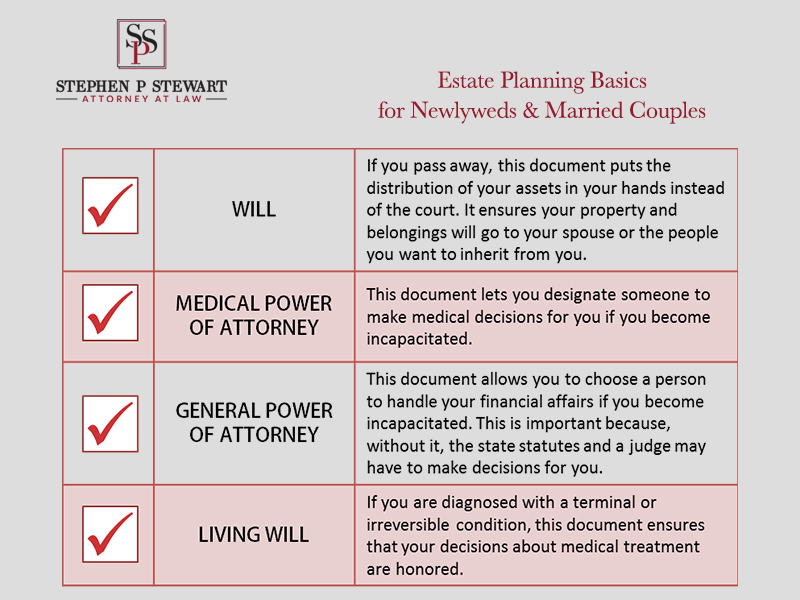What To Do After You Say “I Do” by Stephen P. Stewart, Esq.

After the vows are spoken and you return home from the honeymoon, there is still something you need to do before embarking on your new life as a married couple: plan your estate. Marriage is, on many levels, a merger of two lives into one. What most people don’t realize is that “I do” is the first step in the process, not the last. There are still things you need to do to make the “merger” complete.
What do I mean by that? Here are some things you need to consider:
Do you know who inherits your property if you are married and die without a will? Most people assume that their spouse inherits all of their property if they die without a will. That is not necessarily the case. The correct answer is “it depends.” In North Carolina, if you die without a will, there is a set of statutory default rules that dictate how your property will be distributed at your death called the Intestate Succession Act. If either of your parents is living at your death, depending on the size of your estate, your spouse may end up sharing your estate with your surviving parents. If you have children, your spouse may end up sharing your estate with your children. If your children are minors, you may have to go to court and appoint a guardian to manage their share of the estate.
What happens if you become incapacitated and unable to make financial decisions? Who makes those decisions for you? Again, many people assume that their spouse has more authority than they do in these situations. Your spouse can exercise authority over any joint accounts you own together, but has absolutely no authority to deal with assets that are in your name alone. In the absence of a trust or power of attorney, your spouse will be forced to have a guardian appointed to manage your separate assets.
What about joint ownership? Won’t that solve the problem without having to pay someone to draft an estate plan? Cash and investments can be held in joint accounts with a right of survivorship. When a husband and wife purchase a home together, unless there is something specific to the contrary in the deed, the share of a deceased spouse automatically passes to the survivor. However, it is highly unlikely that you will own everything you have jointly with your new spouse. In fact, if this is a second marriage for either of you, there will likely be some very good reasons for keeping assets separate, such as children from a prior marriage. More often than not, joint ownership is not the answer, at least not the complete answer.
What about your IRA, 401(k) and life insurance? At your death, these assets pass to the beneficiary you designated when you opened the account, started work, or first purchased the policy. Therefore, you need to review and update your beneficiary designations to include your spouse. If you do not designate a beneficiary, most IRA account agreements, 401(k) plans, and insurance contracts by default pay proceeds to your estate. These default provisions are disastrous for IRAs and 401(k)’s because you lose the benefit of a spousal rollover and, instead, your estate must withdraw the entire balance of the account within 5 years, resulting in higher taxes and loss of years of tax deferred growth. If you die without a will, your spouse may end up sharing the proceeds with someone else.
Digital Estate Planning

What about your digital assets? If you are like most people, you have multiple digital assets such as a Facebook account, an iTunes library, a Google Play account, one or more email accounts and some sort of cloud storage where you store pictures, videos and other content of great sentimental value. Have you thought about how your loved ones will access this content if you become incapacitated or die? Without proper planning, the hard truth is that your family will not be able to access your digital assets and content without a court order, if at all.
North Carolina addressed this problem in 2016 with the adoption of the Revised Uniform Fiduciary Access to Digital Assets Act (“the Act”). Under the Act, a user can authorize the custodian of digital content (such as Facebook) to release digital content to an authorized representative designated by: (1) an online tool provided by the custodian; or (2) express language in a valid will, trust, power of attorney or other record. In order for your family to access your digital assets if something happens to you, you need to take some sort of action today.
Who will make health care decisions for you if you become incapacitated? In this case, the law does allow a patient’s spouse to make decisions for the incapacitated patient, if the spouse is available. Does your spouse know what your wishes are with regard to life sustaining procedures? What happens if your spouse is unavailable because of a common accident or other reason? Who will consent to health care for you and make your wishes regarding life sustaining measures known to the doctors? If you haven’t thought about this you should.
What about the children?
Whether you have children now or plan to have them later, it is never too early to plan for what should happen to them if both you and your spouse die. If you have or will have minor children, you have to plan for two major aspects of their care: (1) who will have physical custody of and will care for your children; and (2) who will control and manage their assets or estate until they come of age. You can either make those decisions now through a properly drafted will and/or trust or leave it up to the courts to decide for you.
The best gift a married couple can give themselves is the certainty, security, and peace of mind that comes from a properly drafted and implemented estate plan. Through a carefully thought out combination of wills, trusts, general powers of attorney, health care powers of attorney and/or advanced directives (“living wills”), I can help you address all of these issues and more. Please call or email me so that we can discuss your needs and how best to meet them.




